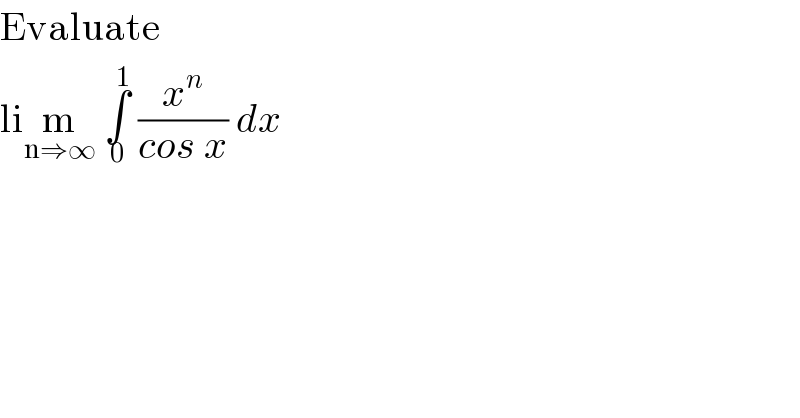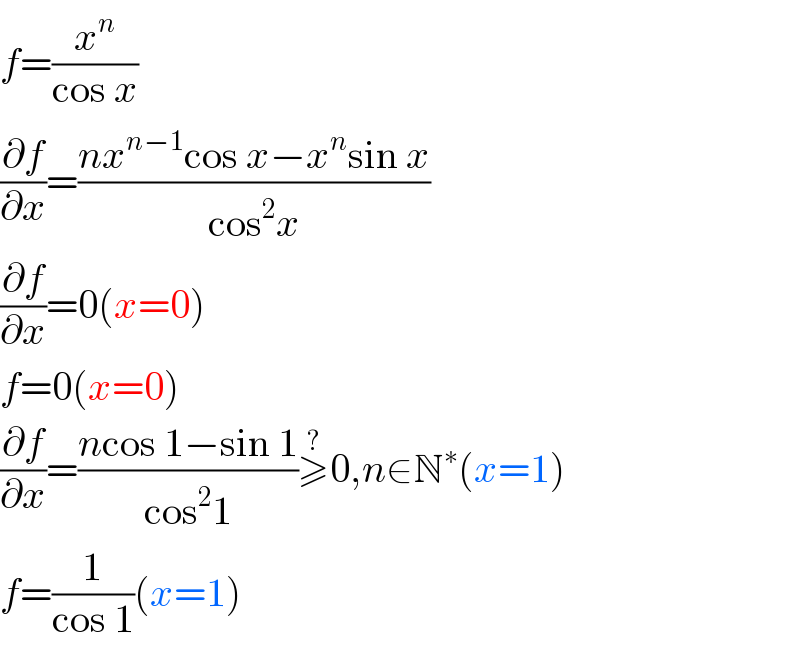
Question Number 382 by novrya last updated on 25/Jan/15

$$\mathrm{Evaluate}\: \\ $$$$\mathrm{li}\underset{\mathrm{n}\Rightarrow\infty} {\mathrm{m}}\:\underset{\mathrm{0}} {\overset{\mathrm{1}} {\int}}\:\frac{{x}^{{n}} }{{cos}\:{x}}\:{dx} \\ $$
Commented by 123456 last updated on 26/Dec/14

$$\mathrm{0}\leqslant{x}\leqslant\mathrm{1}\Rightarrow\mathrm{0}\leqslant{x}^{{n}} \leqslant{x}\leqslant\mathrm{1} \\ $$$$\mathrm{0}\leqslant{x}\leqslant\mathrm{1}\Rightarrow\mathrm{cos}\:\mathrm{1}\leqslant\mathrm{cos}\:{x}\leqslant\mathrm{1}\: \\ $$
Commented by 123456 last updated on 26/Dec/14

$${f}=\frac{{x}^{{n}} }{\mathrm{cos}\:{x}} \\ $$$$\frac{\partial{f}}{\partial{x}}=\frac{{nx}^{{n}−\mathrm{1}} \mathrm{cos}\:{x}−{x}^{{n}} \mathrm{sin}\:{x}}{\mathrm{cos}^{\mathrm{2}} {x}} \\ $$$$\frac{\partial{f}}{\partial{x}}=\mathrm{0}\left({x}=\mathrm{0}\right) \\ $$$${f}=\mathrm{0}\left({x}=\mathrm{0}\right) \\ $$$$\frac{\partial{f}}{\partial{x}}=\frac{{n}\mathrm{cos}\:\mathrm{1}−\mathrm{sin}\:\mathrm{1}}{\mathrm{cos}^{\mathrm{2}} \mathrm{1}}\overset{?} {\geqslant}\mathrm{0},{n}\in\mathbb{N}^{\ast} \left({x}=\mathrm{1}\right) \\ $$$${f}=\frac{\mathrm{1}}{\mathrm{cos}\:\mathrm{1}}\left({x}=\mathrm{1}\right) \\ $$
Commented by 123456 last updated on 26/Dec/14

$$\mathrm{0}\overset{?} {\leqslant}\underset{\mathrm{0}} {\overset{\mathrm{1}} {\int}}{fdx}\overset{?} {\leqslant}\frac{\mathrm{1}}{\mathrm{cos}\:\mathrm{1}} \\ $$
Answered by prakash jain last updated on 27/Dec/14
![Trying with series expansion of sec x for ∣x∣<(π/2) ∫ (x^n /(cos x))dx=∫x^n sec xdx =∫x^n [1+(1/2)x^2 +(5/(24))x^4 +((61)/(720))x^6 +...]dx =(x^(n+1) /(n+1))+(1/2)∙(x^(n+3) /(n+3))+(5/(24))∙(x^(n+5) /(n+5))+.. With x=1 and n→∞ the given limit is 0.](Q387.png)
$$\mathrm{Trying}\:\mathrm{with}\:\mathrm{series}\:\mathrm{expansion}\:\mathrm{of}\:\mathrm{sec}\:{x}\:\mathrm{for}\:\mid{x}\mid<\frac{\pi}{\mathrm{2}} \\ $$$$\int\:\frac{{x}^{{n}} }{\mathrm{cos}\:{x}}{dx}=\int{x}^{{n}} \mathrm{sec}\:{xdx} \\ $$$$=\int{x}^{{n}} \left[\mathrm{1}+\frac{\mathrm{1}}{\mathrm{2}}{x}^{\mathrm{2}} +\frac{\mathrm{5}}{\mathrm{24}}{x}^{\mathrm{4}} +\frac{\mathrm{61}}{\mathrm{720}}{x}^{\mathrm{6}} +...\right]{dx} \\ $$$$=\frac{{x}^{{n}+\mathrm{1}} }{{n}+\mathrm{1}}+\frac{\mathrm{1}}{\mathrm{2}}\centerdot\frac{{x}^{{n}+\mathrm{3}} }{{n}+\mathrm{3}}+\frac{\mathrm{5}}{\mathrm{24}}\centerdot\frac{{x}^{{n}+\mathrm{5}} }{{n}+\mathrm{5}}+.. \\ $$$$\mathrm{With}\:{x}=\mathrm{1}\:\mathrm{and}\:{n}\rightarrow\infty\:\mathrm{the}\:\mathrm{given}\:\mathrm{limit} \\ $$$$\mathrm{is}\:\mathrm{0}. \\ $$
